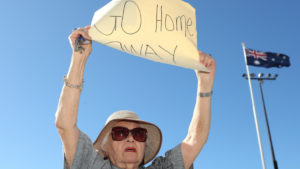Virgin Australia shares set to delist from the ASX today as Bain Capital takes control

Virgin Australia shares will delist from the ASX today as the Bain Capital takeover closes (Pic: Getty)
Virgin Australia (ASX:VAH) shares will be taken off the Australian bourse at the close of trading today as Bain Capital takes control.
The move brings to an end a 17-year listed life for the company since its 2003 IPO when it had a market capitalisation of $2.3 billion.
The airline spent the 2000s as a budget airline, gaining a foothold following Ansett’s collapse. In the 2010s it pivoted to being a full service carrier to rival Qantas, a move that saw substantially drained finances for several years.
Virgin collapsed into administration in April as COVID-19 essentially wiped out demand.
The process has ended with US private equity firm Bain Capital taking charge of the airline, a move that becomes official today.
It will see all Virgin’s airline investors (Singapore Airlines, Etihad, Nanshan and HNA) all be wiped out as well as its retail shareholders.
The move will be a bitter end for shareholders who by 2020 held under 10 per cent of the airline.
Virgin Australia shares will delist at 8.6 cents a pop – 45 per cent lower than they began 2020 at.
It is also far below the highs of 2015 when it reached 50 cents per share.
Shares have been suspended since it entered administration in April.
Virgin Australia (ASX:VAH) share price chart
What now?
The airline is hopeful that the upcoming summer holiday season will see a resurgence in passenger numbers.
Last week it launched a major sale and a new marketing campaign starring America’s Got Talent finalist Annie Jones.
https://www.youtube.com/watch?v=lopmUNUJERs&feature=emb_title
It will face an arguably stronger competitive environment than ever with Regional Express (ASX:REX) launching capital city flights next year and Qantas (ASX:QAN) adding capacity back as fast as it can.
It also has to deal with weak confidence of would-be travellers, further dented by the latest round of state border closures.
Another casualty of the pandemic was its former CEO Paul Scurrah.
Last month, Scurrah resigned – reportedly after a falling out between him and Bain Capital over the airline’s future direction.
Scurrah said he’d be “cheering from the sidelines” for the airline to succeed. Replacing him is former Jetstar boss Jayne Hrdlicka.
Passengers of Virgin have fared better than share holders. The Velocity Frequent Flyer has survived and if you have money in flight credits with Virgin you’ll have until mid-2022 to use them.
Some of Virgin’s lounges are set to reopen in the coming days but the post-COVID size of its lounge network is still to be determined.
Related Topics
UNLOCK INSIGHTS
Discover the untold stories of emerging ASX stocks.
Daily news and expert analysis, it's free to subscribe.
By proceeding, you confirm you understand that we handle personal information in accordance with our Privacy Policy.








